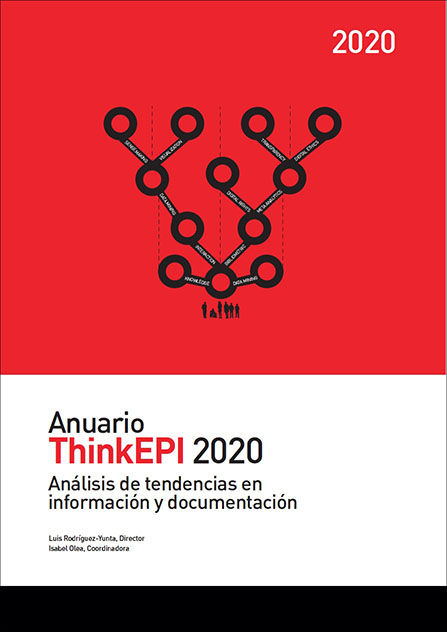¿Qué transforman los acuerdos transformativos?
DOI:
https://doi.org/10.3145/thinkepi.2020.e14e04Palabras clave:
Acceso abierto, Acuerdos transformativos, Bibliotecas académicas, Big deals, Comunicación científica, Consorcios de bibliotecas, Revistas científicas, Suscripciones conjuntas.Resumen
El mundo de la comunicación científica hace años que está viviendo cambios convulsos de los que emerge una nueva realidad. Las revistas científicas están en crisis debido a tres factores: su acceso no es para todos, sus costes son excesivos y su gestión cada vez se aleja más de la academia. El movimiento del acceso abierto empuja con fuerza para que el intercambio de información entre los científicos sea universal, pero esto exige tener modelos económicos que hagan sostenible este sistema.Uno de los posibles modelos es el de los llamados acuerdos transformativos, que se caracterizan por usar el dinero tradicionalmente destinado a suscripciones para pagar los costes de publicar en abierto. Este desplazamiento en el destino de los pagos tendría que ser neutral en costes (es decir, no implicar más recursos) pero permitir que muchos artículos pasen a ser de acceso abierto. En este texto definimos y caracterizamos este tipo de acuerdos y presentamos los debates, distorsiones y disrupciones que han generado.Los acuerdos transformativos, especialmente desde la formulación del Plan S, están siendo usados por algunos países para acelerar la transición hacia el acceso abierto, pero han generado también interesantes discusiones. Los acuerdos de este tipo, ¿perjudican a editores y revistas que son totalmente de acceso abierto? ¿Serán transitorios o han venido para quedarse? ¿Tendrán el efecto de desequilibrar los delicados acuerdos consorciados actuales de reparto de costes? ¿Generarán un efecto polizón que hará que haya instituciones que dejen de aportar? ¿Son los costes realmente neutrales y frenarán los incrementos?
Citas
Abadal, Ernest; López-Borrull, Alexandre; Ollé-Castellí , Candela; Garcia-Grimau, Francesc (2019). "El Plan S para acelerar el acceso abierto: contexto, retos y debate generado". Hipertext.net, n. 19, p. 75-83. https://doi.org/10.31009/hipertext.net.2019.i19.06
AmeliCA (2019). Principios y valores. http://amelica.org/index.php/principios-y-valores
Anderson, Rick (2019). "They know we know they know: Does Sci-Hub affect library subscriptions?". The scholarly kitchen, 2 July. https://scholarlykitchen.sspnet.org/2019/07/03/they-know-we-know-they-know-does-sci-hub-affect-library-subscriptions
Anglada, Lluís (2017). "La adquisición de las revistas". En: Abadal, Ernest (ed.). Revistas científicas. Situación actual y retos de futuro. Barcelona: Universitat de Barcelona Edicions, p. 105-116. ISBN 978 84 9168 038 3 http://www.publicacions.ub.edu/ficha.aspx?cod=08719
Borrego, Ángel (2017). "La revista científica: un breve recorrido histórico". En: Abadal, Ernest (ed.). Revistas científicas. Situación actual y retos de futuro. Barcelona: Universitat de Barcelona Edicions, p. 19-34. ISBN 978 84 9168 038 3 http://www.publicacions.ub.edu/ficha.aspx?cod=08719
Current (2020). Current transformative agreements are not transformative. Position paper. For full, immediate and transparent open access. Copernicus Publications, JMIR, MDPI, Ubiquity Press, Frontiers. https://frontiersinblog.files.wordpress.com/2020/03/position-statement-transformative-agreements.pdf
De-Castro, Pablo (2020). "Acuerdos "˜transformativos´ con los editores: un controvertido paso adelante en la implantación del acceso abierto". Anuario ThinkEPI, v. 14, e14e03. https://doi.org/10.3145/thinkepi.2020.e14e03
Esac (2020a). Agreement registry. https://Esac-initiative.org/about/transformative-agreements/agreement-registry
Esac (2020b). Guidelines for transformative agreements. https://esac-initiative.org/about/transformative-agreements/guidelines-for-transformative-agreements
Esac (2020c). Transformative agreements. https://esac-initiative.org/about/transformative-agreements
Finch, Janet (2012). Accessibility, sustainability, excellence: How to expand access to research publications. Report of the Working Group on Expanding Access to Published Research Findings. https://www.sconul.ac.uk/publication/accessibility-sustainability-excellence-how-to-expand-access-to-research-publications
Herman, Eti; Akeroyd, John; Bequet, Gaelle; Nicholas, David; Watkinson, Anthony (2020). "The changed -and changing- landscape of serials publishing: Review of the literature on emerging models". Learned publishing, v. 33. https://doi.org/10.1002/leap.1288
Hinchliffe, Lisa-Janicke (2019a). "Transformative agreements: A primer". The Scholarly Kitchen, 23 April. https://scholarlykitchen.sspnet.org/2019/04/23/transformative-agreements
Hinchliffe, Lisa-Janicke (2019b). "Will transformative agreements unravel library consortia?" The scholarly kitchen, 20 May. https://scholarlykitchen.sspnet.org/2019/05/20/transformative-agreements-unravel-library-consortia
Hinchliffe, Lisa-Janicke (2020). "Seeking sustainability: Publishing models for an Open Access age". The scholarly kitchen, 7 April. https://scholarlykitchen.sspnet.org/2020/04/07/seeking-sustainability-publishing-models-for-an-open-access-age
Jisc (2020). Requirements for transformative open access agreements: Accelerating the transition to immediate and worldwide Open Access. https://www.jisc-collections.ac.uk/About-JISC-Collections/Supporting-transition-to-Open-Access/OA-Requirements
Larivií¨re, Vincent; Haustein, Stefanie; Mongeon, Philippe (2015). "The oligopoly of academic publishers in the digital era". PLOS one, v. 10, n. 6, e0127502. https://doi.org/10.1371/journal.pone.0127502
López, Ianko; Ponsati-Obiols, Agní¨s; Baquero-Arribas, Mercedes (2015). La participación española en SCOAP3: haciendo posible el acceso abierto a publicaciones científicas del área de física de partículas. http://hdl.handle.net/10261/134993
Robinson-Garcia, Nicolás; Costas, Rodrigo; Van-Leeuwen, Thed N. (2020). State of Open Access penetration in universities worldwide. http://doi.org/10.5281/zenodo.3713422
Schimmer, Ralf; Geschuhn, Kai-Karin; Vogler, Andreas (2015). Disrupting the subscription journals´ business model for the necessary large-scale transformation to Open Access. http://hdl.handle.net/11858/00-001M-0000-0026-C274-7
Shieber, Stuart (2014). "A true transitional open-access business model". The occasional pamphlet on scholarly communication, 28 March. https://blogs.harvard.edu/pamphlet/2014/03/28/a-true-transitional-open-access-business-model
Smith, MacKenzi; Anderson, Ivy; Vjork, Bo-Christer; McCabe, Mark; Solomon, David; Tananbaum, Greg; Tenopir, Carol; Willmott, Matthew (2016). Pay it forward: Investigating a sustainable model of Open Access article processing charges for large North American research institutions [Final report]. UC Office of the President: University of California Systemwide Libraries. https://escholarship.org/uc/item/8326n305
University of California (2020). An introductory guide to the UC model transformative agreement.https://osc.universityofcalifornia.edu/uc-publisher-relationships/resources-for-negotiating-with-publishers/negotiating-with-scholarly-journal-publishers-a-toolkit/an-introductory-guide-to-the-uc-model-transformative-agreement
Van-der-Vooren, Robert (2019). Introducing pay-to-publish in cost distribution models of "˜The Bibsam Consortium, Sweden´: The impact of transformative publisher contracts on cost distribution to consortium participants. A study comissioned by The National Library of Sweden https://urn.kb.se/resolve?urn=urn:nbn:se:kb:publ-49
Wise, Alicia; Estelle, Lorraine (2019). SPA-OPS - Transformative agreement toolkit. https://doi.org/10.6084/m9.figshare.9805043.v1
Wise, Alicia; Estelle, Lorraine (2020). "How society publishers can accelerate their transition to open access and align with Plan S". Learned publishing, v. 33, n. 1, p. 14-27. http://doi.org/10.1002/leap.1272


